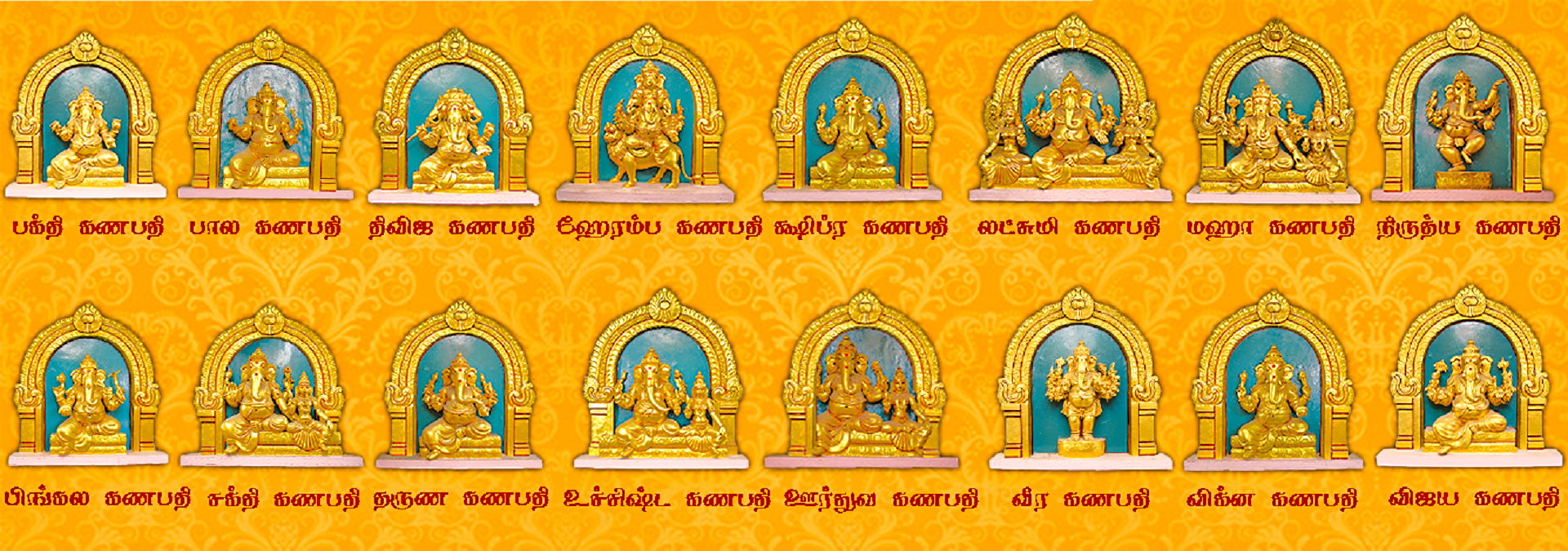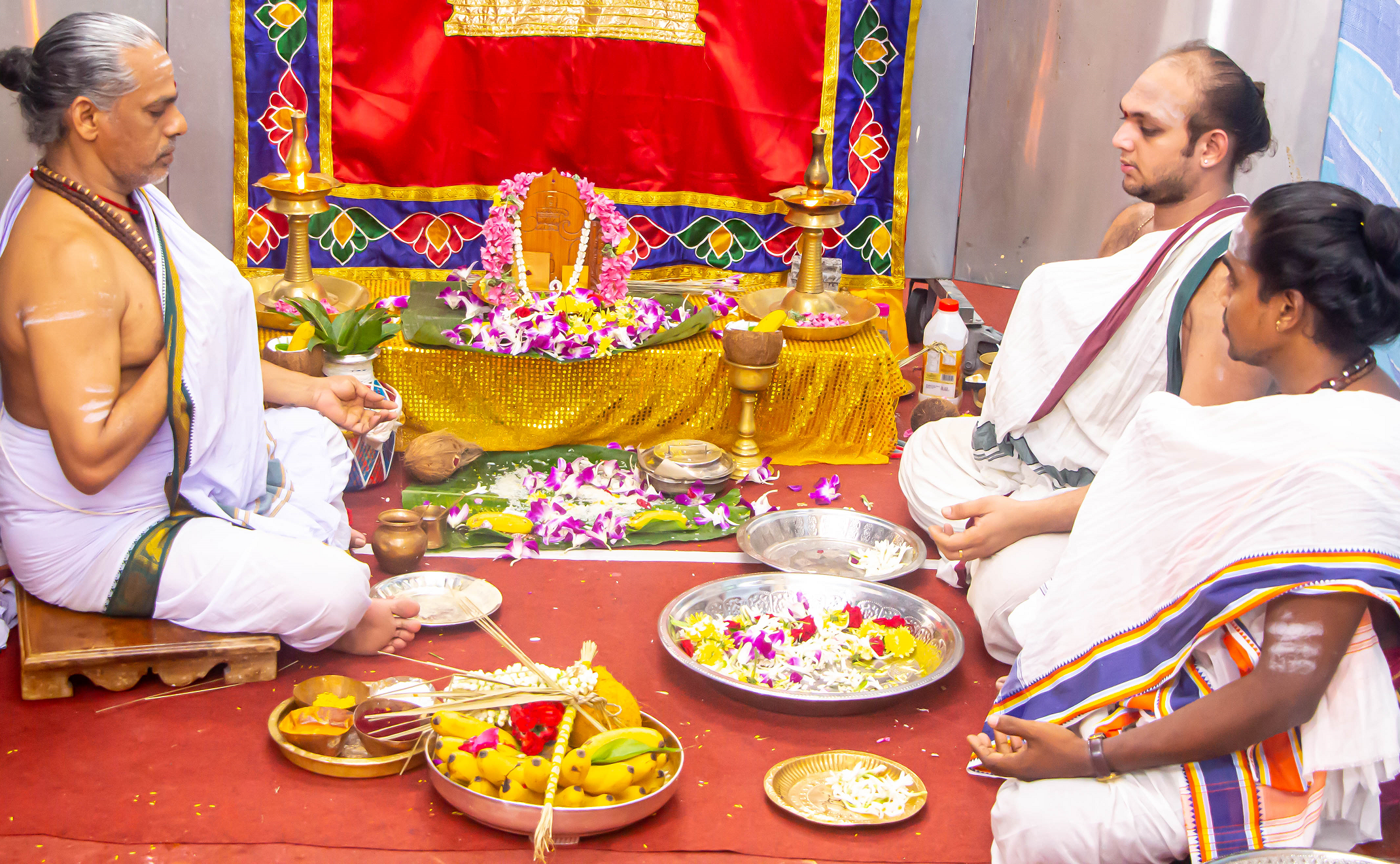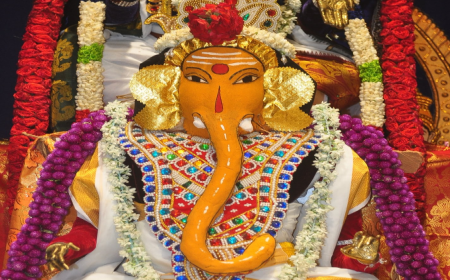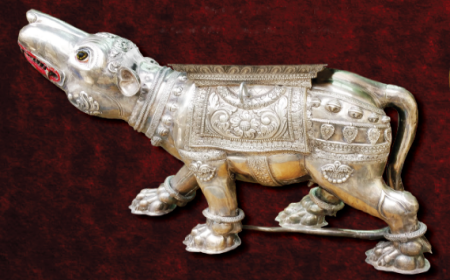
First God of Hindus
Lord Sri Vinayagar, more commonly known as Ganesha, Pillayar (in South India), Ganapathi or Vigneswarar, is the foremost god of the Hindu pantheon. Vinayagar represents knowledge and is the remover and destroyer of obstacles. Also known as the Elephant god, he is the eldest son of Lord Shiva (Destroyer in the Hindu Holy Trinity of Creator-Preserver-Destroyer) and his consort, Parvathi (Shakti). His younger brother is Lord Murgan also known as Sri Thendayuthapani.
Hindus look upon the countenance of Vinayagar with great affection. He has the head of an elephant, complete with curved trunk and big ears. As the elephant is the symbol of extreme intelligence, likewise, Vinayagar is the embodiment of wisdom and intelligence. There are four podgy hands joined to human pot-bellied body. One hand holds a trishul or trident, the second an ankush or goad made from his own broken tooth; the third holds a lotus and the fourth a rosary or, a modak or modakam, his favourite sweet. Sometimes, there is a tray of modakam in front of him or held by his trunk.
Vinayagar’s right tusk is broken. The legend is that Vinayagar, as the embodiment of intelligence (Buddhi) and achievement (Siddhi), was approached by sage Vyasa with a prayer to write down the Mahabharatha, even as he composed the hundreds of thousands of its verses. Vyasa recited the verses without a pause and Vinayagar wrote without stopping. However, halfway through the recitation, Vinayagar’s stylus broke but he quickly broke off his right tusk and continued writing without stopping.

Significance
The elephant is a symbol of might and magnitude. The elephant’s foot is larger than that of any other animal. The elephant can make its way through the densest jungle. These signify the qualities of a leader who shows the way for others. The elephant is highly intelligent. The elephant is also known for its fidelity and gratitude. An elephant will not forget its master under any circumstances. Even in its last moments, if an elephant hears the voice of its master, it will open its eyes and look for him. It will sacrifice its life for its master. These are the lessons man should learn from the elephant. Intelligence without gratitude is valueless. Every man should be grateful to those who have helped him.
There are some inner secrets that should be noted in the worship of Vinayagar. Hindus make modakam as an offering to Vinayagar. These sweetmeats are made entirely by using steam instead of heat from a burning stove. Rice flour, jaggery and dhal are combined and rolled into balls, which are steamed. According to Ayurvedic practice, modakams, are accorded a high place for their curative properties. The jaggery (or raw sugar) used is a remedy for various ailments. It also helps to improve the vision. The inner meaning is that such offerings to Vinayagar have health giving properties. It is noticeable that food items cooked in steam are easy to digest. The Vinayagar Principle symbolizes health, bliss, peace, wisdom, prosperity and many other things. There is a special way to worship Sri Vinayagar. One has to hold his ears with crossed arms, kneel three times and followed by patting the cheek three times. The meaning of doing this is to apologise to the Almighty and ask for forgiveness for all the sins and mistakes one has committed. Finally, lying prostrate in front of the sanctum, followed by sitting in silence for a minute, completes the prayer.
First Prayer
The first prayer of a Hindu is always to Vinayagar. Vinayagar is invoked at the beginning of all ritualistic worship. The recitation of holy songs begins with the recitation of a Vinayagar mantra or song. He is invoked before a family moves into a house. While there are countless Vinayagar temples, every Hindu temple dedicated to other deities, including the Vaishnavite temple, has a statue of him. Vinayagar is not only worshipped by Hindus, He has a place in many other religions and nations of people, such as the Buddhists and the Jains. His name might not be the same but the figure is similar and so are the ideas that Vinayagar represents – auspiciousness, prosperity, well being and wisdom.


Why Elephant Head
Legends say that Goddess Parvati, wife of Lord Shiva, created him out of the sandalwood dough that she used for her bath. Parvathi modeled the sandalwood dough into a boy, called him her son and breathed life into him. She assigned him the task of standing guard at the door while she went to have her bath. However, while Parvati was taking her bath, Lord Shiva returned. On discovering that the boy guarding the door to his house would not let him enter, he flew into a rage and severed the head of the boy. When Parvathi broke down in utter grief, Shiva realized that he had beheaded his own son. In order to soothe her, Shiva sent out his squad to fetch the head of any sleeping being that was facing the north. The company found a sleeping elephant and brought back its severed head, which was then attached to the body of the boy. Shiva restored him to life and made him the leader of his troops. Hence, the name ‘Ganapathi’. Shiva also bestowed a boon that people would worship him and invoke his name before undertaking any venture. That is why he is called the First god of Hindus and all Hindu temples have an idol of Sri Vinayagar in the front. A devout Hindu has to pray him before entering the temple.
Mooshiga Vahanam
The Elephant God rides on a Mooshiga Vahanam. Mooshiga means Mouse and Vahanam means a Carrier or a Vehicle that carries a god. The mouse symbolizes the mind of Man, running in different directions, ruled by impulses. Man is also capable of being wise, strong and hardworking like the elephant. Therefore, Man’s goal is to remove the mouse qualities and become more like the elephant. The difference in size between the Elephant God and the tiny mouse also indicates that the divine truth is the same in all, irrespective of size, birth or race. Another meaning is also given to the mouse. The mouse moves everywhere unnoticed and steals or destroys food. Like the mouse, egoism too exists unnoticed in our minds and silently wrecks havoc in our lives. When controlled by divine wisdom, however, the ego can aid progress.

